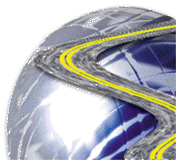

Welcome Letter and Project Description
Welcome to the GTK-7 Web site!
We would like to invite your school to participate with a team of engineering and/or business students in the sixth GLOBETECH International Joint-Venture Project Simulation offered in the Fall of 2001 via the Internet by the Nerken School of Engineering at Cooper Union, and sponsored by the NSF's Gateway Engineering Education Coalition.
The GLOBETECH-7 (GTK-7) simulation will take place between October 2 and December 11, 2001. Participation is free of any charge. The general theme of the simulation is: "New Energy Source Joint-Venture Projects in Poland, Taiwan and the USA". The three specific joint-venture projects to be discussed and negotiated during the simulation are:
- The construction of 1000 fuel-cell equipped scooters and light motorcycles per year in Taiwan.
- The construction of a 18 MW wind farm in Poland.
- The construction of a 30 MW wind farm in the USA.
The GTK-7 simulation works in the following manner:
- The various participating student teams get acquainted as soon as possible at the beginning of the semester. Cooper Union will start classes on September 4, 2001, and plan to be available to support all the other participating teams in their preparation work. The simulation starts October 4, 2001. The simulation subjects and the various technical and international project management issues will be discussed by the student teams and faculty via e-mail, Internet Chat, and planned teleconferences.
- Three (or more) student teams prepare the requests for proposals (RFP's) for the above three projects.
- The other teams bid, and prepare the Proposals answering the RFP's for one, two, or all the projects.
- The proposals are then negotiated via e-mail, Internet Chat and/or Teleconferences among the RFP and Proposal teams, and at the end of the simulation the contracts are awarded to the teams (one for each project) that have submitted and negotiated the best overall proposals (technical feasibility, price, etc..).
- The feedback process from students and faculty takes place, and the simulation ends.
The main benefits of The GLOBETECH simulation are:
- In a relatively short period of time (10 weeks), students have the opportunity to explore global technology management, sustainable development, and alternative energy issues by working on concrete projects,
- They can substantially increase their familiarity with the use of the Internet for research and team communications,
- Learn the specifics of international joint-venture project proposals, negotiations, contracts, etc.,
- Improve their team work, leadership, verbal and written communication skills. Foreign students can also increase their proficiency in English,
- Both students and faculty have the opportunity to collaborate with other schools and broaden their domestic and international contacts and collaboration.
- For those participating students who are interested, Cooper Union's Global Perspectives in Technology Management course (EID-372) will also be available on the WWW. The course is an interdisciplinary elective, open to juniors, seniors, and graduate students. It is offered between September 4 and December 11, 2001, and upon completion earns 3 credits.
In previous years the simulation was well received by students and faculty from such engineering or business schools as: Carnegie Mellon, Rensselaer Polytechnic, University of Nancy, ESC Toulouse, and the Albi School of Mines/ France, Iasi Technical University/Romania, St. Petersburg Technical University/Russia, and Tokyo Polytechnic/Japan.
The simulation is geared towards junior, senior and graduate engineering students. Since the treatment of the discussed projects is quite general, students from a variety of engineering management, environmental, electrical, mechanical, etc. courses can participate in the simulation. All the necessary background information and bibliography will be posted on the Internet, on the project's Home Page, prior to September 4, 2001.
For further details about our previous simulations, you are welcome to visit our GLOBETECH-6 (offered in the fall of 2000) site at: www.cooper.edu/GTK-6/ or contact Prof. Roxanne Jacoby at: jacoby@cooper.edu
If you are not able to participate, please do us the favor of circulating this letter among your colleagues for the benefit of others who might be interested in this project.
Thank you for your attention,
Prof. Roxanne Jacoby, P.E.e-mail: jacoby@cooper.edu
Cooper Union, New York, U.S.A.
August 2001


